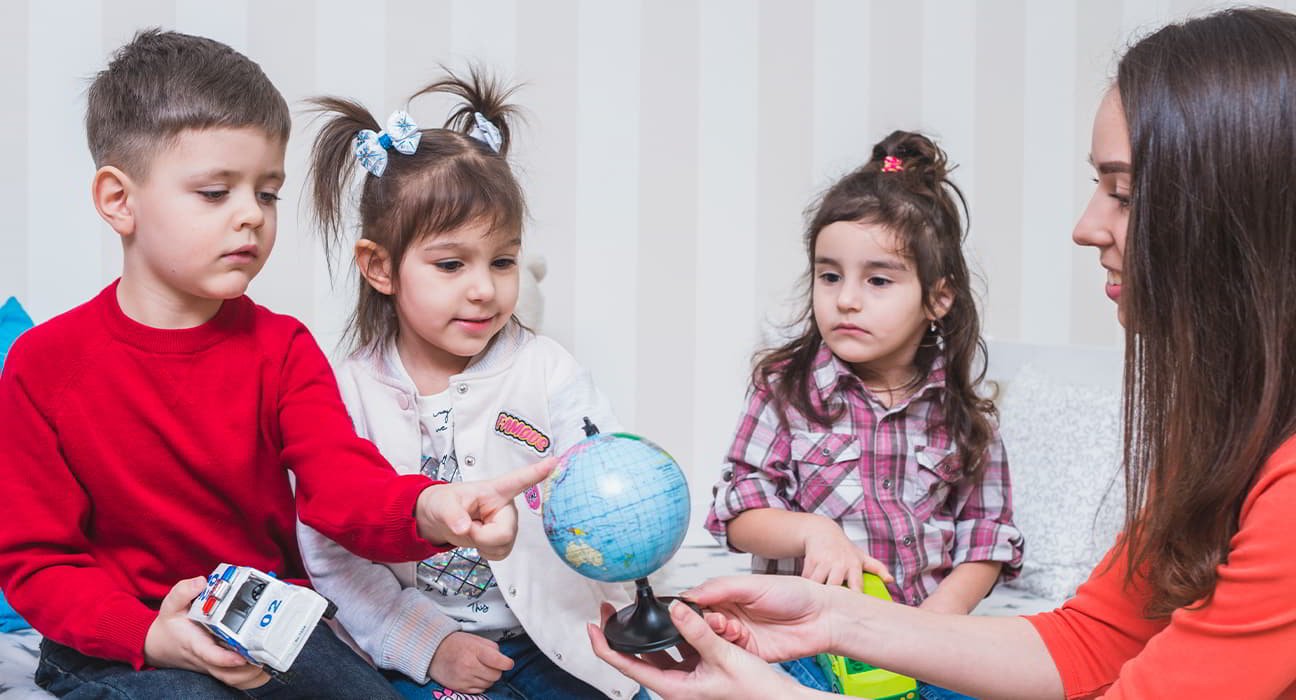Each human being has an innate propensity for social interaction that exists in everyone including the newborn. Even infant of three months old have the innate ability to communicate with their parents or others around them through actions like blinking, sobbing, wriggling their arms and legs, cooing or talking, etc. The basis for children’s social engagement is established by this. An infant will learn a lot in the first few years of life, including how to crawl, walk, talk, and do a variety of other things. They acquire knowledge of words, numbers, forms, colours, objects, people, and much more.
Related: Role of Play in Child Development and Emotional Expression
Child will discover who their parents are, as well as who their siblings, grandparents, and friends are. They will start to learn how to interact with the various individuals in their lives, whether it is by gazing at them, displaying their favourite toy, or making an effort to speak. Young children start to grasp that communication is essential for understanding others. Someone will comfort them if they weep.
For young toddlers, social engagement is crucial. They will be able to learn from social encounters based on those interactions Because it is difficult to make new acquaintances, shy people are unlikely to suddenly change their behaviours and cease being shy. They might try to be more outgoing and have some success, but they are unlikely to be the most outgoing person in the room. A child who develops appropriate social skills will find it simpler to fit in with others throughout their entire life.
Related: Babbling: An Initial Sign of Child Development
Technology also plays a significance role in early childhood education now, Although technology can offer important educational opportunities, it should not take the place of the value of social connection. Parents and educators should work to strike a balance between the use of technology and chances for social engagement.
Importance of Early Childhood Interaction
Increased Cooperation
Many individuals prefer working on projects alone, cooperation is a valuable skill to develop because it is used in many facets of life, including parenting. Children will learn how to express their thoughts, how to compromise, that sharing is important, and they will comprehend that they are cooperating to accomplish a shared objective. While playing with other kids, this is also present. They may not be aware of it, but they are actually learning how to cooperate, which is necessary for their game to succeed.
Recognising social cues
Children will learn to recognise emotions through body language and facial expressions as they play and learn with one another as nonverbal communication is one of the important parts of a child’s development.
Improved Communication
Children can learn communication skills through various social interaction, which are another crucial lesson along with social skills. You engage in communication on a regular basis, therefore teaching children good communication skills early on can benefit them for the rest of their lives. Children will learn how to express their feelings,
communicate with others, and build a sense of self.
Development of Friendships
This is just another excellent reason to engage in social interaction. Friendships are a beautiful thing and also provide children with a sense of belonging and help them build self-esteem, especially when they’re at school. Children require friendships throughout their academic careers to feel accepted and a member of a community. If they have friends, they will feel more self-assured, which can encourage them to be more extroverted.
Making friends will also aid in the improvement of their interpersonal abilities, including their capacity to read social cues, communicate, and cooperate with others. If they argue, kids will develop greater problem-solving skills and learn how to handle this challenging circumstance.
Resolving conflicts
There may be a variety of conflicts that may emerge, and for kids to settle them on their own, they need to be assured, collected, and proficient in language. Social skills are crucial in preventing youngsters from using hurtful language or behaviours. Young children make progress in their abilities to resolve disagreements as their social and linguistic skills advance, which increases their level of independence.
Encouraging social connection in children
Learning while playing
Never undervalue the educational value of play for Children. What may only appear to be youngsters playing can actually teach a variety of skills, including sharing, settling conflict, developing imagination and creativity, and forming bonds with other kids.
Promoting social engagement
Give children small duties or obligations, such as helping you set the table for supper or cleaning and organising their room, to teach them responsibility. For young children, these activities are also incredibly empowering because they boost their self-esteem and promote social engagement.
Learning through Arts and crafts
It offers children’s ability to develop their motor abilities and imaginative flair. Children start having talks about the things they are making, which helps them grow. The best part is to encourage messy play with paints, water, foam, or other materials.
Be a role model
One of the most effective ways to educate your child on social skills is by setting an example for them. Use of words when interacting with others by using the words “please” and “thank you.” Be respectful when speaking to others so that your child can observe and imitate you.
Pretend play /Roleplaying
Role-playing is another successful strategy for fostering the growth of social skills. Make sure you have the opportunity to use your skills. You can act out being in a restaurant and showing them how to make an appropriate request. Ask the child what they recall after they read a story to make sure they are learning to listen. When telling a narrative, make sure to make eye contact. After going through the event, you might ask them how they felt in order to make sure they get its significance.
Praise and positive reinforcement
An excellent technique to keep a child motivated to use social skills is through positive reinforcement. When praising someone, be clear by using sentences like, “Thank you for keeping your toys in place.” These straightforward words of affirmation demonstrate that they are abiding by the regulations.
Children who learn social skills will have healthier interactions with others throughout their lives. An essential component of interacting in society is having social skills. In order to have strong social skills, one must demonstrate good manners, communicate effectively with others, show consideration for others’ feelings, and convey personal needs As a result, social interaction is crucial to a child’s overall development
Read More Articles from Psychologs
- Theories Of Child Development: Know About the Whole Stages
- Can Disney Play a Major Role in Child Development?
- 11 Effective Methods to Teach Children Good Habits
- Impact of Parental Abuse on Child Development
- Impact of Parental Abuse on Child Development













Leave feedback about this